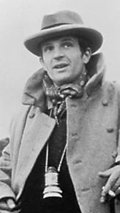FORTY YEARS LATER, we know they had it right at Cannes, where neophyte filmmaker Francois Truffaut won the best director prize for The 400 Blows. That was 1959; this is now. So why do your parents—or grandparents—drone on about the French New Wave? Forty years ago, Hollywood was beleaguered by television and federal antitrust decrees; pictures were getting stale, or turning into bloated, garishly colored spectaculars. Critic-turned-director Truffaut and his Cahiers du Cin魡 pals came along at just the right time, invigorating our movies—which they loved, selectively—as they sought to revolutionize theirs.
FRANCOIS TRUFFAUT: A CELEBRATION
runs October 22-November 4 at Varsity
Shockingly, Truffaut and the nouvelle vogue are now closer chronologically to the era of silent cinema than we are to The 400 Blows. So, four decades after the initial acclaim, how does his reputation stand up? That’s the question raised by the two-week run of this 19-film retrospective, all of which is worth seeing. Unlike his prickly counterpart Jean-Luc Goddard, Truffaut became a real celebrity, collaborating on many pictures, acting in others (including Spielberg’s Close Encounters of the Third Kind). Thus it can be difficult to separate Truffaut the public figure and auteur—literally “author”—of the semiautobiographical Antoine Doinel films from his separate existence as director.
TROUBLED YOUNG DOINEL first appears in The 400 Blows, remarkably portrayed by 13-year-old Jean-Pierre L页d. A fresh look at this classic film reminds us that its technique is utterly without ostentation—in marked contrast to the flashy camera work of Hitchcock (one of Truffaut’s heroes). Unlike the angry young manifestos he hurled against stodgy French cinema, this is a remarkably gentle, impressionistic film, letting events convey a mood rather than leading to some artificial conclusion. No one’s a monster in Doinel’s dysfunctional family; Truffaut’s too generous and wise to allow characters or plot to fall into the usual clich鳮
Yet Truffaut lived to see auteur theory become an anachronism, a joke in the eyes of subsequent French critical theorists who gleefully pronounced “the death of the author.” In this light, it’s fascinating to view his 1980 film The Last Metro, a late-career work that initially seems like a conventional romantic triangle set in occupied France. Constant reference is made to the absent director of a Paris theater company, but he’s actually lurking beneath the stage, secretly directing a play while he hides from the Nazis. Analogously, despite Metro‘s rather familiar backstage story, Truffaut employs the same long, inquisitive tracking shots—often reversing direction like the gaze of an eye—that we see in Blows. His presence is always felt. And, yes, his career fulfilled the promise implicit in his famously indelible image of Doinel first seeing the ocean, then staring at you as if to ask, “What next?”








